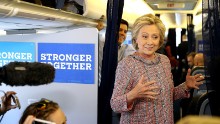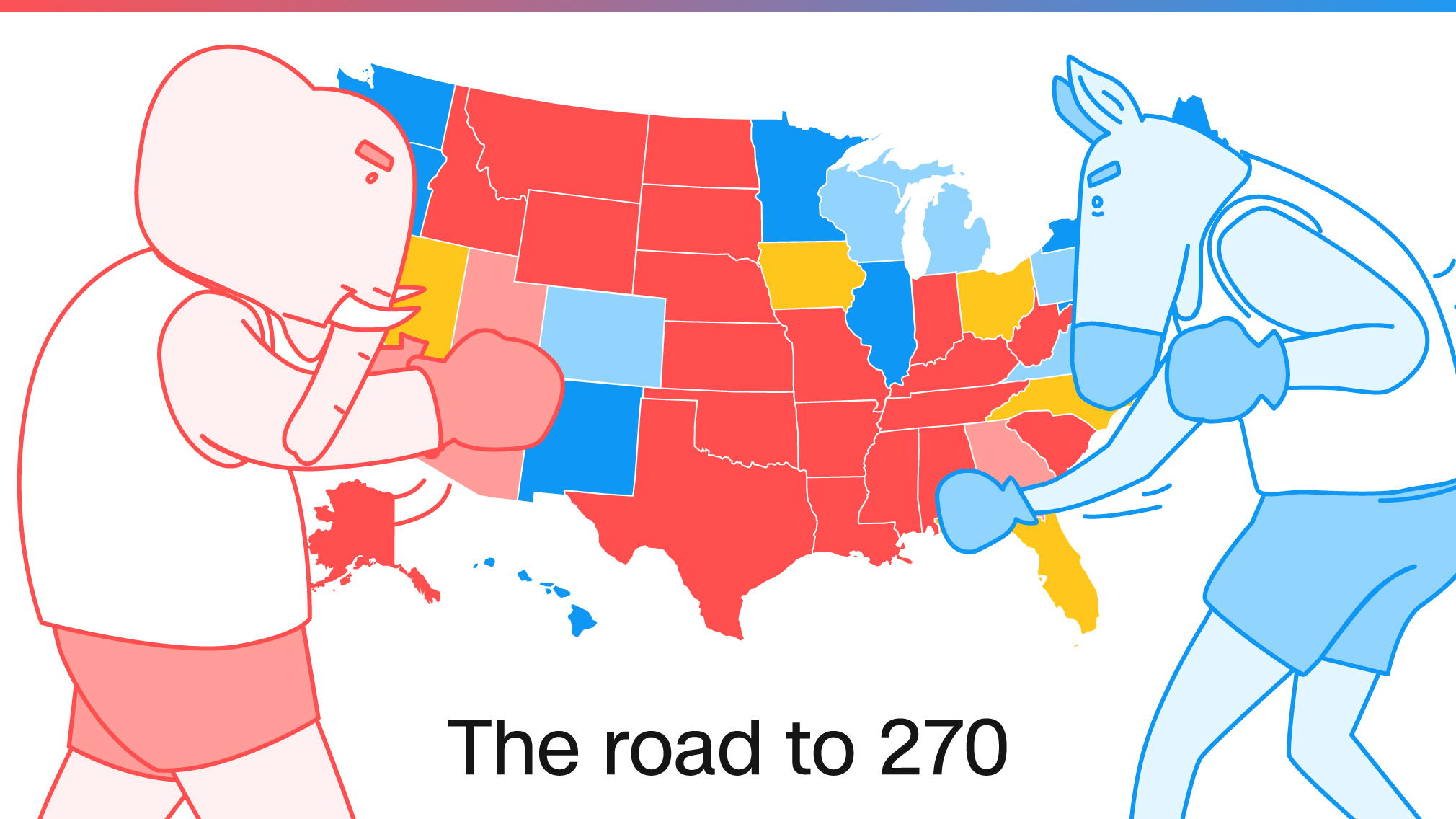Why Democrats are anxious
Donald Trump's reversal on the "birther" controversy is turning attention -- at least for the moment -- from a major shift in the presidential race.
The battle for the White House -- dominated by Hillary Clinton only weeks ago -- is tightening dramatically, a nerve-wracking turn for Democrats that sets up what could be a nail-biter election in 52 days.
A cascade of new polls this week suggest close contests in key states such as Virginia -- the home of Clinton's running mate -- and Michigan, where Democrats have won every cycle since 1992.
Nationally in CNN's poll of polls, Clinton stands at 43% to Trump's 41%. In the must-win states of Florida and Ohio, Trump and Clinton are deadlocked in this week's CNN/ORC poll, as well as several other surveys.
In Iowa -- a state President Barack Obama won twice -- Trump leapt to an 8-point lead among likely voters over Clinton in a Monmouth University poll released Thursday (his largest lead yet in a battleground state). And in Virginia, Clinton and Trump were virtually tied at 40% to 37%.
Of course, the 2016 campaign has plenty of twists ahead that could once again reshape the race in an instant. The latest came Friday when Trump ended five years of pushing conspiracy theories about Obama's birthplace and finally acknowledged he was born in the United States. And the first presidential debate, which will likely be a pivotal moment for both campaigns, is nine days away.
But the recent polls underscore concerns about the effectiveness of Clinton's strategy, which has centered on convincing voters Trump is unfit to be commander in chief, as well as her ability to lift vulnerable House and Senate Democrats in November with the same effectiveness as Obama in 2008 and 2012. The Democratic nominee is coming off one of the toughest weeks of her campaign, forced to the sidelines for three days to recover from pneumonia.
Still, she returned to the campaign trail with a trip to the crucial swing state of North Carolina and insisted she is in a "strong position."
"What matters is who registers to vote, and who is motivated and mobilized to turn out to vote," she told reporters. "And I'm going to keep doing everything I can to deliver my message about what's at stake in this election."
Striking takeaways
One of the most striking takeaways from the poll findings this week is that even with all of Trump's controversies and polarizing comments, Clinton is still struggling to stitch together key parts of the Obama coalition. That point was particularly evident in the new NBC/Wall Street Journal/Marist state polls this week that showed her with softer support from Latinos and young voters than Obama.
Many young voters still have issues trusting Clinton, said John Della Volpe, director of polling at the Harvard Institute of Politics, and that is driving them to third-party candidates like Libertarian Gary Johnson, who is polling close at 7% to 8% in some states.
"This (election) really, in some ways, is coming down to young voters," said Della Volpe. "She has not yet solidified what arguably should be one of the core constituencies of any Democratic campaign."
It is with those voters where surrogates like Obama and Bernie Sanders will be so key to Clinton's efforts. First Lady Michelle Obama made her debut on the campaign trail Friday with a trip to George Mason University in Fairfax, Virginia, where she encouraged young people to show up to the polls in November.
"When I hear folks saying they're not inspired in this election, I disagree," Obama said. "I am inspired because for eight years, I have had the privilege to see what it takes to do this job and here's what I know for sure. ... Right now, we have an opportunity to elect one of the most qualified people who has ever endeavored to become president."
Pence says he's getting 'whiff of desperation' from Democrats
Clinton and her allies brushed off the week's new numbers as an expected development in what the Democratic candidate said was always going to be "a tight race."
Joel Benenson, Clinton's chief strategist, told CNN's Erin Burnett in an interview Thursday that the campaign was still "playing for 270 electoral votes."
"We are still playing more offense in states around the country and keeping the Trump campaign on defense, particularly in states that are must-wins for them like Virginia and North Carolina," Benenson said. "They're not making us play defense anywhere."
Trump's shakeup
The improvement in Trump's standing comes several weeks after the real estate magnate shook up his campaign team and began delivering more disciplined, teleprompter-guided speeches. Several pollsters and strategists said Thursday that Trump's more measured behavior appears to be reassuring Republicans who were uneasy about voting for him -- and had refused to commit until now.
"What's happened as much as anything else is that the election is taking on the contours of the 2012 election to a very large extent," said Democratic pollster Geoff Garin. "The ups and downs in the race have depended on the degree to which (Mitt) Romney voters from 2012 considered Trump to be acceptable or beyond the fringe. ... Right now, what we are seeing in the polls is that more Romney voters are willing to go with Trump."
Garin, an adviser to the pro-Clinton super PAC Priorities USA Action, suggested that, in the long run, there could be an advantage to Trump's calmer demeanor for his Democratic opponent.
"When Donald Trump is not behaving, he's sort of like a car crash that people can't help but stop and look at," Garin said. "If Trump is being less outrageous and less titillating, it means that Hillary Clinton has a better chance to get her own message through and have the election litigated on her own terms."
In a reflective speech Thursday, Clinton said her few days off the trail helped clarify what the 2016 campaign is about. Contrasting her style and tone with her rival's, she once again called Trump "a loose cannon" who would put America's gains at risk. Charting her course for the next few weeks, she said she would focus on working families and the challenges facing young people. In a nod to her vulnerabilities, she also acknowledged some of the criticisms of her public persona.
"I have been involved in politics one way or another for many years. It is not an easy business. It can get rough and I have built up some defenses," she said. "When it comes to public service, I am better at the service part than the public part."
But she said she was not "the showman" that her opponent is and promised to "deliver for you and your family," which will be one of the cornerstones of her message in the final stretch of the campaign.
Down-ballot races
The closeness of the polls clearly could mean more difficult races for down-ballot Democratic Senate and House candidates who are hoping Clinton's candidacy, and her well-organized operation, will give them a lift at the polls.
In New Hampshire this week, for example, Republican Sen. Kelly Ayotte opened an 8-point lead over Democratic Gov. Maggie Hassan: 52% to 44% among likely voters in a new NBC/WSJ/Marist poll after earlier polls had showed a much closer race.
As voters are paying more attention to the race, University of New Hampshire Survey Center Director Andy Smith said Clinton's vulnerabilities are coming into sharper focus and that is having a drag on the ticket. So much attention has been focused on Trump throughout the campaign, he said, that people paid less attention to how unpopular Clinton was.
Donald Trump: I'm 'the least racist person'
"The candidate who has coattails is the candidate who is going to be able to pull in voters who might not otherwise have voted -- and that's what Obama was able to do in 2008 and 2012, especially among younger voters, African-American voters and minority voters," Smith said.
But this year, many of those young voters in New Hampshire voted for Vermont Sen. Bernie Sanders in the primary, Smith noted.
"Obama was able to pull them out in 2008, and to a lesser extent in 2012, and they voted for Democrats down the ticket, but they're much less likely to vote this time around with Clinton at the top of the ticket," he said.
Some Democrats expect the Obama coalition to coalesce as Election Day draws closer.
"There is clearly a gap for Clinton with younger voters that her campaign will pay attention to," said Bill Burton, a former adviser to Obama. "But once younger voters realize that anything but a vote for Clinton is a vote for Trump, the numbers will settle and the artificially high Gary Johnson numbers will come back to earth ... The Obama coalition is lagging in getting behind Clinton, but the debates will help natural gravity set in and bring this race where it will end."
Other Democrats see a bright side to a closer race at the top of the ticket in the sense that it could propel more voters to get out to the polls. House Minority Leader Nancy Pelosi said Thursday that if Republicans want to believe that this race is tightening, "let them believe that."
"Because the more our own people see that it's important to vote, and a tight race sort of speaks to that urgency, then more of them will turn out. So it works to our advantage," Pelosi said.
News Courtesy: www.cnn.com












